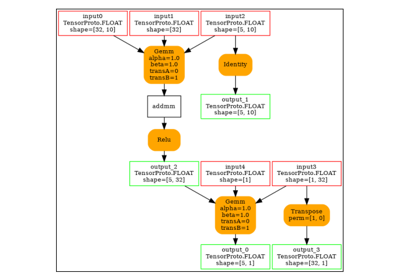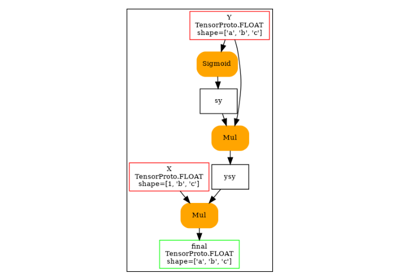Note
Go to the end to download the full example code.
101: Some dummy examples with torch.export.export¶
torch.export.export() behaviour in various situations.
Easy Case¶
A simple model.
import torch
class Neuron(torch.nn.Module):
def __init__(self, n_dims: int = 5, n_targets: int = 3):
super().__init__()
self.linear = torch.nn.Linear(n_dims, n_targets)
def forward(self, x):
z = self.linear(x)
return torch.sigmoid(z)
exported_program = torch.export.export(Neuron(), (torch.randn(1, 5),))
print(exported_program.graph)
graph():
%p_linear_weight : [num_users=1] = placeholder[target=p_linear_weight]
%p_linear_bias : [num_users=1] = placeholder[target=p_linear_bias]
%x : [num_users=1] = placeholder[target=x]
%linear : [num_users=1] = call_function[target=torch.ops.aten.linear.default](args = (%x, %p_linear_weight, %p_linear_bias), kwargs = {})
%sigmoid : [num_users=1] = call_function[target=torch.ops.aten.sigmoid.default](args = (%linear,), kwargs = {})
return (sigmoid,)
With an integer as input¶
As torch.export.export
documentation, integer do not show up on the graph.
An exporter based on torch.export.export() cannot consider
the integer as an input.
class NeuronIInt(torch.nn.Module):
def __init__(self, n_dims: int = 5, n_targets: int = 3):
super().__init__()
self.linear = torch.nn.Linear(n_dims, n_targets)
def forward(self, x: torch.Tensor, i_input: int):
z = self.linear(x)
return torch.sigmoid(z)[:, i_input]
exported_program = torch.export.export(NeuronIInt(), (torch.randn(1, 5), 2))
print(exported_program.graph)
graph():
%p_linear_weight : [num_users=1] = placeholder[target=p_linear_weight]
%p_linear_bias : [num_users=1] = placeholder[target=p_linear_bias]
%x : [num_users=1] = placeholder[target=x]
%i_input : [num_users=0] = placeholder[target=i_input]
%linear : [num_users=1] = call_function[target=torch.ops.aten.linear.default](args = (%x, %p_linear_weight, %p_linear_bias), kwargs = {})
%sigmoid : [num_users=1] = call_function[target=torch.ops.aten.sigmoid.default](args = (%linear,), kwargs = {})
%select : [num_users=1] = call_function[target=torch.ops.aten.select.int](args = (%sigmoid, 1, 2), kwargs = {})
return (select,)
With an integer as input¶
But if the integer is wrapped into a Tensor, it works.
class NeuronIInt(torch.nn.Module):
def __init__(self, n_dims: int = 5, n_targets: int = 3):
super().__init__()
self.linear = torch.nn.Linear(n_dims, n_targets)
def forward(self, x: torch.Tensor, i_input):
z = self.linear(x)
return torch.sigmoid(z)[:, i_input]
exported_program = torch.export.export(
NeuronIInt(), (torch.randn(1, 5), torch.Tensor([2]).to(torch.int32))
)
print(exported_program.graph)
graph():
%p_linear_weight : [num_users=1] = placeholder[target=p_linear_weight]
%p_linear_bias : [num_users=1] = placeholder[target=p_linear_bias]
%x : [num_users=1] = placeholder[target=x]
%i_input : [num_users=1] = placeholder[target=i_input]
%linear : [num_users=1] = call_function[target=torch.ops.aten.linear.default](args = (%x, %p_linear_weight, %p_linear_bias), kwargs = {})
%sigmoid : [num_users=1] = call_function[target=torch.ops.aten.sigmoid.default](args = (%linear,), kwargs = {})
%index : [num_users=1] = call_function[target=torch.ops.aten.index.Tensor](args = (%sigmoid, [None, %i_input]), kwargs = {})
return (index,)
Wrapped¶
Wrapped, it continues to work.
class WrappedNeuronIInt(torch.nn.Module):
def __init__(self, model):
super().__init__()
self.model = model
def forward(self, *args, **kwargs):
return self.model.forward(*args, **kwargs)
exported_program = torch.export.export(
WrappedNeuronIInt(NeuronIInt()), (torch.randn(1, 5), torch.Tensor([2]).to(torch.int32))
)
print(exported_program.graph)
graph():
%p_model_linear_weight : [num_users=1] = placeholder[target=p_model_linear_weight]
%p_model_linear_bias : [num_users=1] = placeholder[target=p_model_linear_bias]
%args_0 : [num_users=1] = placeholder[target=args_0]
%args_1 : [num_users=1] = placeholder[target=args_1]
%linear : [num_users=1] = call_function[target=torch.ops.aten.linear.default](args = (%args_0, %p_model_linear_weight, %p_model_linear_bias), kwargs = {})
%sigmoid : [num_users=1] = call_function[target=torch.ops.aten.sigmoid.default](args = (%linear,), kwargs = {})
%index : [num_users=1] = call_function[target=torch.ops.aten.index.Tensor](args = (%sigmoid, [None, %args_1]), kwargs = {})
return (index,)
List¶
The last one does not export. An exporter based on
torch.export.export() cannot work.
class NeuronNoneListInt(torch.nn.Module):
def __init__(self, n_dims: int = 5, n_targets: int = 3):
super().__init__()
self.linear = torch.nn.Linear(n_dims, n_targets)
def forward(self, x, yz, i_input):
z = self.linear(x + yz[0] * yz[3])
return torch.sigmoid(z)[:i_input]
try:
exported_program = torch.export.export(
NeuronNoneListInt(),
(
torch.randn(1, 5),
[torch.randn(1, 5), None, None, torch.randn(1, 5)],
torch.Tensor([2]).to(torch.int32),
),
)
print(exported_program.graph)
except (torch._dynamo.exc.Unsupported, RuntimeError) as e:
print(f"-- an error {type(e)} occured:")
print(e)
def forward(self, arg0_1: "f32[3, 5]", arg1_1: "f32[3]", arg2_1: "f32[1, 5]", arg3_1: "f32[1, 5]", arg4_1, arg5_1, arg6_1: "f32[1, 5]", arg7_1: "i32[1]"):
# File: ~/github/experimental-experiment/_doc/examples/plot_torch_export_101.py:114 in forward, code: z = self.linear(x + yz[0] * yz[3])
mul: "f32[1, 5]" = torch.ops.aten.mul.Tensor(arg3_1, arg6_1); arg3_1 = arg6_1 = None
add: "f32[1, 5]" = torch.ops.aten.add.Tensor(arg2_1, mul); arg2_1 = mul = None
# File: ~/vv/this312/lib/python3.12/site-packages/torch/nn/modules/linear.py:134 in forward, code: return F.linear(input, self.weight, self.bias)
linear: "f32[1, 3]" = torch.ops.aten.linear.default(add, arg0_1, arg1_1); add = arg0_1 = arg1_1 = None
# File: ~/github/experimental-experiment/_doc/examples/plot_torch_export_101.py:115 in forward, code: return torch.sigmoid(z)[:i_input]
sigmoid: "f32[1, 3]" = torch.ops.aten.sigmoid.default(linear); linear = sigmoid = None
item: "Sym(u0)" = torch.ops.aten.item.default(arg7_1); arg7_1 = item = None
def forward(self, arg0_1: "f32[3, 5]", arg1_1: "f32[3]", arg2_1: "f32[1, 5]", arg3_1: "f32[1, 5]", arg4_1, arg5_1, arg6_1: "f32[1, 5]", arg7_1: "i32[1]"):
# File: ~/github/experimental-experiment/_doc/examples/plot_torch_export_101.py:114 in forward, code: z = self.linear(x + yz[0] * yz[3])
mul: "f32[1, 5]" = torch.ops.aten.mul.Tensor(arg3_1, arg6_1); arg3_1 = arg6_1 = None
add: "f32[1, 5]" = torch.ops.aten.add.Tensor(arg2_1, mul); arg2_1 = mul = None
# File: ~/vv/this312/lib/python3.12/site-packages/torch/nn/modules/linear.py:134 in forward, code: return F.linear(input, self.weight, self.bias)
linear: "f32[1, 3]" = torch.ops.aten.linear.default(add, arg0_1, arg1_1); add = arg0_1 = arg1_1 = None
# File: ~/github/experimental-experiment/_doc/examples/plot_torch_export_101.py:115 in forward, code: return torch.sigmoid(z)[:i_input]
sigmoid: "f32[1, 3]" = torch.ops.aten.sigmoid.default(linear); linear = sigmoid = None
item: "Sym(u0)" = torch.ops.aten.item.default(arg7_1); arg7_1 = item = None
-- an error <class 'torch.fx.experimental.symbolic_shapes.GuardOnDataDependentSymNode'> occured:
Could not extract specialized integer from data-dependent expression u0 (unhinted: u0). (Size-like symbols: none)
Caused by: (_export/non_strict_utils.py:1159 in __torch_function__)
For more information, run with TORCH_LOGS="dynamic"
For extended logs when we create symbols, also add TORCHDYNAMO_EXTENDED_DEBUG_CREATE_SYMBOL="u0"
If you suspect the guard was triggered from C++, add TORCHDYNAMO_EXTENDED_DEBUG_CPP=1
For more debugging help, see https://docs.google.com/document/d/1HSuTTVvYH1pTew89Rtpeu84Ht3nQEFTYhAX3Ypa_xJs/edit?usp=sharing
For C++ stack trace, run with TORCHDYNAMO_EXTENDED_DEBUG_CPP=1
The following call raised this error:
File "~/github/experimental-experiment/_doc/examples/plot_torch_export_101.py", line 115, in forward
return torch.sigmoid(z)[:i_input]
The error above occurred when calling torch.export.export. If you would like to view some more information about this error, and get a list of all other errors that may occur in your export call, you can replace your `export()` call with `draft_export()`.
Loops¶
Loops are not captured.
class NeuronLoop(torch.nn.Module):
def __init__(self, n_dims: int = 5, n_targets: int = 3):
super().__init__()
self.linear = torch.nn.Linear(n_dims, n_targets)
def forward(self, x, xs):
z = self.linear(x)
for i in range(len(xs)):
x += xs[i] * (i + 1)
return z
exported_program = torch.export.export(
NeuronLoop(),
(
torch.randn(1, 5),
[torch.randn(1, 5), torch.randn(1, 5)],
),
)
print(exported_program.graph)
graph():
%p_linear_weight : [num_users=1] = placeholder[target=p_linear_weight]
%p_linear_bias : [num_users=1] = placeholder[target=p_linear_bias]
%x : [num_users=2] = placeholder[target=x]
%xs_0 : [num_users=1] = placeholder[target=xs_0]
%xs_1 : [num_users=1] = placeholder[target=xs_1]
%linear : [num_users=1] = call_function[target=torch.ops.aten.linear.default](args = (%x, %p_linear_weight, %p_linear_bias), kwargs = {})
%mul : [num_users=1] = call_function[target=torch.ops.aten.mul.Tensor](args = (%xs_0, 1), kwargs = {})
%add_ : [num_users=1] = call_function[target=torch.ops.aten.add_.Tensor](args = (%x, %mul), kwargs = {})
%mul_1 : [num_users=1] = call_function[target=torch.ops.aten.mul.Tensor](args = (%xs_1, 2), kwargs = {})
%add__1 : [num_users=0] = call_function[target=torch.ops.aten.add_.Tensor](args = (%add_, %mul_1), kwargs = {})
return (linear,)
Preserve Modules¶
class Neuron(torch.nn.Module):
def __init__(self, n_dims: int = 5, n_targets: int = 3):
super().__init__()
self.linear = torch.nn.Linear(n_dims, n_targets)
def forward(self, x):
z = self.linear(x)
return torch.sigmoid(z)
class NeuronNeuron(torch.nn.Module):
def __init__(self, n_dims: int = 5, n_targets: int = 3):
super().__init__()
self.my_neuron = Neuron(n_dims, n_targets)
def forward(self, x):
z = self.my_neuron(x)
return -z
The list of the modules.
mod = NeuronNeuron()
for item in mod.named_modules():
print(item)
('', NeuronNeuron(
(my_neuron): Neuron(
(linear): Linear(in_features=5, out_features=3, bias=True)
)
))
('my_neuron', Neuron(
(linear): Linear(in_features=5, out_features=3, bias=True)
))
('my_neuron.linear', Linear(in_features=5, out_features=3, bias=True))
The exported module did not change.
print("-- preserved?")
exported_program = torch.export.export(
mod, (torch.randn(1, 5),), preserve_module_call_signature=("my_neuron",)
)
print(exported_program.graph)
-- preserved?
graph():
%p_my_neuron_linear_weight : [num_users=1] = placeholder[target=p_my_neuron_linear_weight]
%p_my_neuron_linear_bias : [num_users=1] = placeholder[target=p_my_neuron_linear_bias]
%x : [num_users=1] = placeholder[target=x]
%linear : [num_users=1] = call_function[target=torch.ops.aten.linear.default](args = (%x, %p_my_neuron_linear_weight, %p_my_neuron_linear_bias), kwargs = {})
%sigmoid : [num_users=1] = call_function[target=torch.ops.aten.sigmoid.default](args = (%linear,), kwargs = {})
%neg : [num_users=1] = call_function[target=torch.ops.aten.neg.default](args = (%sigmoid,), kwargs = {})
return (neg,)
And now?
import torch.export._swap
swapped_gm = torch.export._swap._swap_modules(exported_program, {"my_neuron": Neuron()})
print("-- preserved?")
print(swapped_gm.graph)
~/vv/this312/lib/python3.12/site-packages/torch/export/unflatten.py:1039: UserWarning: Attempted to insert a get_attr Node with no underlying reference in the owning GraphModule! Call GraphModule.add_submodule to add the necessary submodule, GraphModule.add_parameter to add the necessary Parameter, or nn.Module.register_buffer to add the necessary buffer
spec_node = gm.graph.get_attr(name)
~/vv/this312/lib/python3.12/site-packages/torch/export/unflatten.py:1031: UserWarning: Attempted to insert a get_attr Node with no underlying reference in the owning GraphModule! Call GraphModule.add_submodule to add the necessary submodule, GraphModule.add_parameter to add the necessary Parameter, or nn.Module.register_buffer to add the necessary buffer
spec_node = gm.graph.get_attr(name)
-- preserved?
graph():
%x_1 : [num_users=1] = placeholder[target=x]
%_spec_0 : [num_users=1] = get_attr[target=_spec_0]
%_spec_1 : [num_users=1] = get_attr[target=_spec_1]
%_spec_2 : [num_users=1] = get_attr[target=_spec_2]
%tree_flatten : [num_users=1] = call_function[target=torch.utils._pytree.tree_flatten](args = ((%x_1,),), kwargs = {})
%getitem : [num_users=1] = call_function[target=operator.getitem](args = (%tree_flatten, 0), kwargs = {})
%x : [num_users=1] = call_function[target=operator.getitem](args = (%getitem, 0), kwargs = {})
%tree_unflatten_1 : [num_users=1] = call_function[target=torch.utils._pytree.tree_unflatten](args = ([%x], %_spec_1), kwargs = {})
%getitem_1 : [num_users=1] = call_function[target=operator.getitem](args = (%tree_unflatten_1, 0), kwargs = {})
%getitem_2 : [num_users=1] = call_function[target=operator.getitem](args = (%getitem_1, 0), kwargs = {})
%my_neuron : [num_users=1] = call_module[target=my_neuron](args = (%getitem_2,), kwargs = {})
%tree_flatten_spec : [num_users=1] = call_function[target=torch.fx._pytree.tree_flatten_spec](args = (%my_neuron, %_spec_2), kwargs = {})
%getitem_4 : [num_users=1] = call_function[target=operator.getitem](args = (%tree_flatten_spec, 0), kwargs = {})
%neg : [num_users=1] = call_function[target=torch.ops.aten.neg.default](args = (%getitem_4,), kwargs = {})
%tree_unflatten : [num_users=1] = call_function[target=torch.utils._pytree.tree_unflatten](args = ((%neg,), %_spec_0), kwargs = {})
return tree_unflatten
Unfortunately this approach does not work well on big models and it is a provite API.
Total running time of the script: (0 minutes 0.393 seconds)
Related examples

201: Evaluate different ways to export a torch model to ONNX



